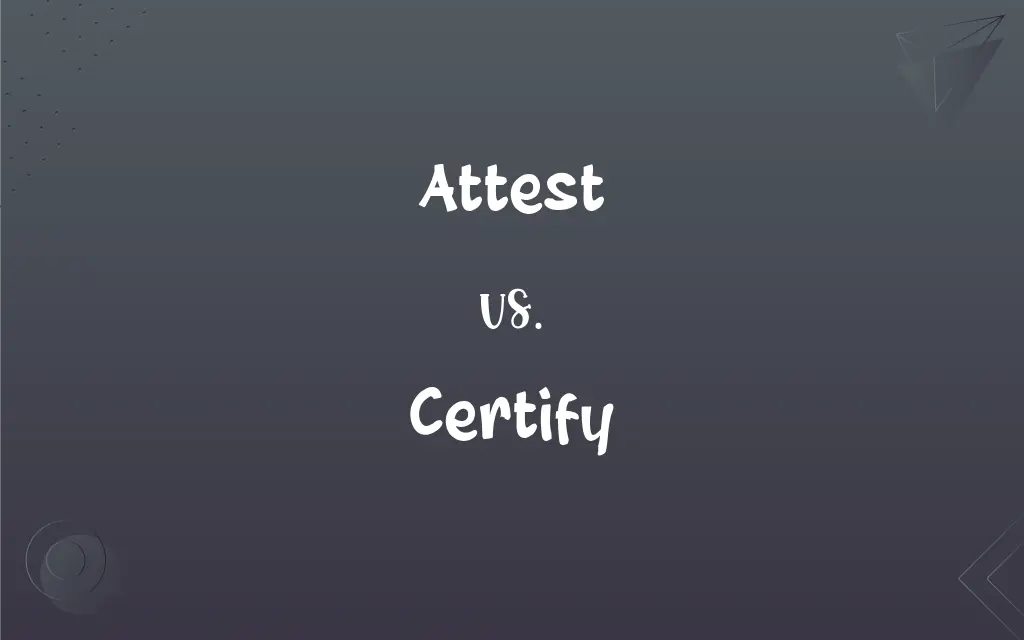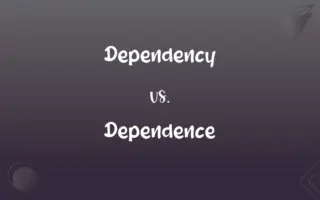Attest vs. Certify: What's the Difference?
Edited by Janet White || By Harlon Moss || Updated on November 29, 2023
Attest refers to bearing witness or confirming something is true based on personal knowledge or belief, while certify involves officially recognizing, guaranteeing, or declaring something as true, often in a formal or legal context.

Key Differences
Attest implies an assertion based on personal knowledge or experience, often used in legal or formal documents to confirm the truth of a statement. Certify, on the other hand, usually involves a higher level of authority or expertise, often requiring official or legal backing to confirm or endorse the validity of something.
In many legal scenarios, a witness may attest to the truth of a statement or event, meaning they declare their direct knowledge or belief about it. Certify usually involves a formal declaration by a qualified individual or entity, asserting the authenticity or accuracy of a document or fact.
Attest can also be used in contexts where someone supports or endorses a concept, idea, or quality based on their understanding or belief. Certify, however, often involves a process of verification or inspection, followed by issuing a certificate or official document to validate something.
When someone attests to something, they may not always have the official capacity or authority to provide legal proof. In contrast, to certify something usually requires the person or organization to have the necessary qualifications or legal power to issue a formal certification.
The act of attesting is often more personal or subjective, relying on an individual’s perception or experience. Conversely, certifying is typically objective, involving a set of standards or criteria that must be met for something to be certified.
ADVERTISEMENT
Comparison Chart
Authority
Based on personal knowledge or belief.
Requires official or legal authority.
Formality
Less formal, more personal.
Highly formal, often legal.
Usage in Documents
Common in witness statements, affidavits.
Used in certificates, licenses.
Reliability
Subjective, based on individual’s assertion.
Objective, based on set criteria.
Legal Implications
Provides personal confirmation.
Often a prerequisite for legal validation.
ADVERTISEMENT
Attest and Certify Definitions
Attest
To witness or certify formally.
The lawyer attested the signature on the document.
Certify
To issue a certificate to.
The course certifies students in first aid.
Attest
To declare something is true or genuine based on personal knowledge.
I can attest to his honesty, having known him for years.
Certify
To officially recognize someone or something as possessing certain qualifications or meeting certain standards.
She was certified as a professional accountant.
Attest
To provide or serve as clear evidence of.
Her skills attest her qualifications for the job.
Certify
To declare legally insane.
The individual was certified and admitted to a psychiatric hospital.
Attest
To affirm to be correct or genuine.
He attested to the accuracy of the report.
Certify
To guarantee or endorse confidently.
The product is certified to be eco-friendly.
Attest
To bear witness or give testimony.
She attested at the trial about what she saw.
Certify
To confirm formally as true, accurate, or genuine.
The document was certified by the notary.
Attest
To affirm to be correct, true, or genuine
The date of the painting was attested by the appraiser.
Certify
To confirm formally as true, accurate, or genuine
The police certified that a suspect had been arrested.
Attest
To certify by signature or oath
Attest a will.
FAQs
What is the legal use of attest?
Legally, attest is used to confirm or bear witness to the validity of a document or statement.
Can anyone attest a document?
Generally, a qualified person such as a notary or witness with relevant knowledge can attest a document.
Does attest require formal certification?
Attest does not usually require formal certification but involves declaring something to be true.
What does certify mean?
Certify means to officially recognize, affirm, or declare something as true, often in a formal or legal context.
Can attest be used in court?
Yes, attesting is commonly used in court through witness testimonies or affidavits.
Can certify imply issuing a certificate?
Yes, to certify often involves issuing a certificate or formal document.
What does attest mean?
Attest means to affirm or declare the truth of something based on personal knowledge or belief.
Is attest subjective?
Yes, attest can be subjective as it often relies on personal belief or knowledge.
Is certification legally binding?
Yes, certifications are often legally binding and carry official weight.
Does attest involve personal experience?
Attest often involves personal experience or firsthand knowledge.
Is the certification process objective?
Certification is generally objective, based on meeting specific standards or criteria.
Is a certified statement always true?
A certified statement is deemed true based on the certifier's authority and criteria, though it's not infallible.
Can attest be informal?
Attest can be somewhat informal, depending on the context and nature of the assertion.
Does certify always involve an official body?
Certify usually involves an official body or authorized individual.
Can certify be related to health or safety standards?
Yes, certify can relate to meeting health, safety, or other regulatory standards.
Who can certify a document?
A document can be certified by an authorized individual such as a notary or an official representative of an organization.
Does attest require a legal background?
Attest does not typically require a legal background, but legal knowledge can be beneficial.
Are there different types of certification?
Yes, there are various types of certification, including professional, product, and quality certifications.
Can attest be used for personal opinions?
Attest can be used for personal opinions, especially when witnessing or vouching for something.
Is a certification always permanent?
Certifications are not always permanent and may require renewal or periodic validation.
About Author
Written by
Harlon MossHarlon is a seasoned quality moderator and accomplished content writer for Difference Wiki. An alumnus of the prestigious University of California, he earned his degree in Computer Science. Leveraging his academic background, Harlon brings a meticulous and informed perspective to his work, ensuring content accuracy and excellence.
Edited by
Janet WhiteJanet White has been an esteemed writer and blogger for Difference Wiki. Holding a Master's degree in Science and Medical Journalism from the prestigious Boston University, she has consistently demonstrated her expertise and passion for her field. When she's not immersed in her work, Janet relishes her time exercising, delving into a good book, and cherishing moments with friends and family.































































